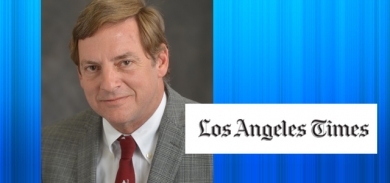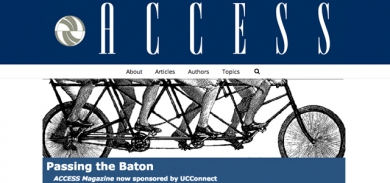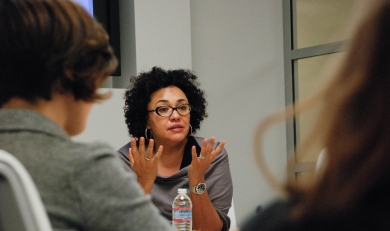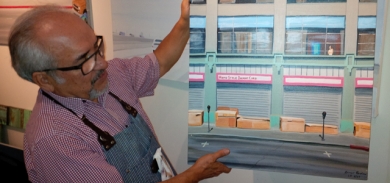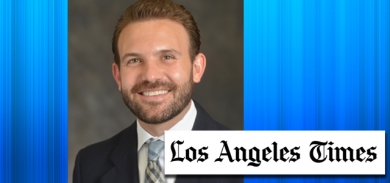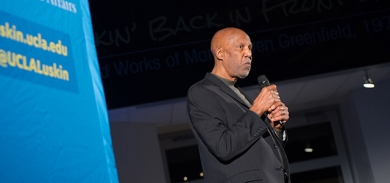
In 1957, Terrence Roberts MSW ’70 was a 16-year-old student at a segregated high school in Little Rock, Arkansas. After the Supreme Court ruled in Brown v. Board of Education that school segregation was unconstitutional, he volunteered to be one of the first black students to enroll at Little Rock High School, a decision with impact that is still being felt today.
As a result, Roberts’ junior year of high school was incredibly difficult. On the first day of school, he and his fellow members of the “Little Rock Nine” were prevented from entering the building by an angry mob backed by the Arkansas National Guard, who had been activated by Gov. Orval Faubus. It wasn’t until three weeks later, when President Eisenhower took control of Faubus’ troops and sent in the 101st Airborne Division of the U.S. Army, that Roberts was able to begin classes. But throughout the year, Roberts and his classmates had to attend school with a military escort, enduring beatings, vicious epithets and a national spotlight that turned him into a face of the nascent Civil Rights Movement.
More than half a century later, Roberts shared his experience at Little Rock High and reflected on a life involved in social justice during a UCLA Luskin Lecture event Dec. 4 at the California African American Museum. With the benefit of distance and time, Roberts made it clear that his experience as a teenager was part of a centuries-long struggle for equality.
“This stuff has been going on since well before you showed up,” Roberts said. From 1619 to 1954, when the Brown ruling was issued, minorities were fundamentally unequal to the white majority in North America. “It was legal to discriminate, to ‘do unto,’ to lynch, to murder,” Roberts said, and violent actions had the full protection of U.S. law.
Although laws have changed since the middle of the last century, Roberts said, changes to the legal system are just the beginning — and, given the recent protests in reaction to police officer-involved deaths in Ferguson, Mo., and New York, clearly an inadequate solution to resolve longstanding racial tensions.
As he contemplated a way forward after the “horrendous, cold-blooded murders” of Michael Brown and Eric Garner, Roberts cautioned of a long, difficult road ahead. “This has been going on for centuries,” he said.
“This stuff is so woven into the fabric of our society it is so difficult to disentangle ourselves, especially when there is a lack of will to do so,” he added.
At its heart, Roberts spoke of the problem of racial inequality as a dispute over space—“physical, psychological and economic” boundaries within which the powerful majority feels threatened by the onset of a competing community. Roberts crossed a physical boundary by breaking the color barrier in high school, but in the decades since he has seen the resistance of the racial majority as a reaction to a perceived intrusion by outsiders.
In the face of this framing of the problem, Roberts counseled that protests ought to be nonviolent if they hope to advance the racial conversation and lead to progress. In response to a question squaring Roberts’ view with the facts that Brown and Garner were killed by police despite their nonviolent actions, Roberts said, “Death looms above us all.”
“The powers that be will see you for who you are — nonviolent or angry — and take you out of their space,” and violent actions by the minority will only make the problem worse, he said.
Throughout the talk Roberts exhibited the discipline and unflappability he learned in the unwelcoming halls of Little Rock High, and which he nurtured further throughout a career as an educator and consultant. In 1999, President Clinton honored the Little Rock Nine with the Congressional Gold Medal.
When a member of the audience asked how he managed to control his emotions in the face of daily abuse as a student, he said, “My emotions are under my control. Anger and rage are possible choices, but they’re not the only ones.”
Going forward, Roberts advocated that members of the audience take action to change the culture around “the racial conversation.” With more than 50 years of continued racial tension despite changes to laws, progress will only be realized through persistent pressure on cultural values, he said. After all, laws without community support aren’t enough.
“When you do things that seem forward, progressive, you have to check with the will of the people,” he said.
More photos from the event
